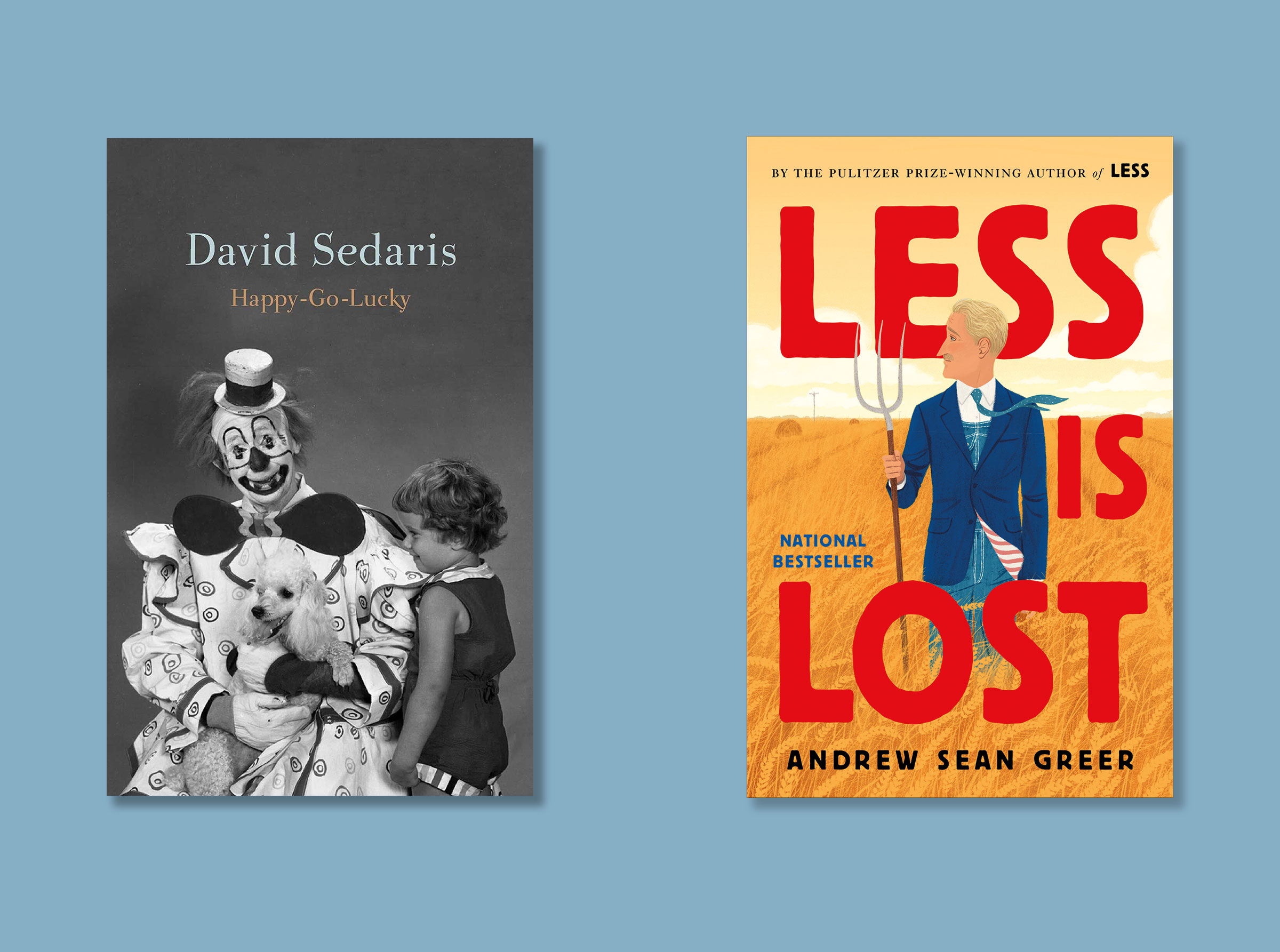
Though Andrew Sean Greer and David Sedaris met fairly recently—after Greer reviewed Sedaris’ book The Best of Me in 2021—they already banter like old pals, each fighting to land the last laugh. The authors share a lot in common: they are both celebrated for humorous writing that slyly examines humanity and for making cutting observations about the world in which we live. They also love to shop. The beginning of their friendship included a New York City shopping excursion. “Andy will try on anything,” Sedaris says. Greer raises the stakes: “Everything!”
Another thing these two authors have in common: each has traveled extensively throughout the U.S. Greer’s new novel Less Is Lost, a sequel to his Pulitzer Prize-winning 2017 novel Less, out now, follows the successful but awkward novelist Arthur Less on a road trip across the country. Greer himself spent time on the road to research what such a trip might entail—and found himself traversing communes, visiting dive bars, and sporting wraparound sunglasses in an attempt to blend in with locals. (The last one didn’t work, and his novel’s protagonist goes through a similar snafu.) These moments and more coalesce into a laughter-packed narrative about writing, privilege, and loss.
Reflections on similar themes can be found in Sedaris’ latest essay collection, Happy-Go-Lucky, which was published in May. In it, Sedaris described his experiences grappling with the pandemic, a multi-city book tour, and the death of his father. While his book is a nonfiction and Greer’s is a novel, both explore what it means to be a person in America and how to cope with loss, all through a comedic lens.
Read More: The 5 Funniest Books Ever
In an international phone conversation, Greer calling in from San Francisco and Sedaris from his country home in Sussex, England, the authors discussed their recent travels, how they find humor in loss, and where they look to learn more about the people around them.
TIME: Both of your books feature traveling around America. What’s your favorite place you’ve visited in the U.S. in the last few years?
David Sedaris: I was really surprised by Durango, Colorado. It looks like they’d film a Western there. They have a rushing river that feels like you could just bend down and drink out of it. There’s a trail that runs along both sides for miles and miles and miles. I walk until my toenails turn black and fall off, so it’s great to wake up in the town, go outside my door, use this beautiful trail, and all you hear is rushing water. What’s your place Andy?
Andrew Sean Greer: Bisbee, Arizona. It’s way down south, almost at the border and right near New Mexico. I was driving along trying to get to Tucson and spent the night, parked the RV there. I went to a rock and roll show and went out with the singers afterward to a bar. It was super charming without being hipster.
Sedaris: Did you dance?
Greer: I danced.
Sedaris: Do you dance wildly?
Greer: I do. I often am stopped if I go to a show. People around me will say, “Please stop dancing,” and the song playing is called “Dance, Dance, Dance.” I’m doing what they’re telling me to do! But I’m not aware of my surroundings.
Sedaris: What were you doing in the RV?
Greer: This was the RV trip I took to research Less Is Lost. I went to every small town I could find on the map.
Sedaris: Then what do you do? Do you keep a diary?
Greer: I do exactly what you do. You carry a notebook around, right? And you are constantly writing? That’s what I do. Also like you, I’m utterly curious about people.

TIME: What’s the best mode of transportation to learn the most about people?
Sedaris: The bus! People’s phones don’t necessarily work on trains, but they do on buses. It’s changed a little bit. It used to be, on a British bus, everybody was talking on the phone. You’ve never heard so many languages spoken in such a small space. But now most people are texting or looking at Instagram, and all of their friends look like them. I wonder: Do you choose your friends because they look just like you? Do my friends look just like me?
Greer: In the early days of Lyft there was the fantasy that it was a kindergarten teacher who needed some money to go to Spain so you rode in her car with her. I would talk to every single person for the whole ride, and I just loved that. That’s all gone now.
Sedaris: Why is it gone? What happened?
Greer: Everyone else gets on their phone, so they expect not to talk to you anymore. But sometimes they do. The driver I got in New York the last time I saw you, we had a long conversation where I told him I was gay and he said, “You really should try it with a woman first before you commit. You should go to Thailand and hire a prostitute.” I hadn’t heard anything like that in a long time. I was like, “Tell me more! Where should I go?”
TIME: A strand in both your books is the real-life David and the fictional Less suffering various mishaps and humiliations. How do you use embarrassment to elicit empathy?
Sedaris: Usually, the most embarrassing thing you can bring up is what most people can relate to. We’re not that different, and if something embarrassing happened to you, chances are it happened to a lot of other people.
Read More: The 33 Most Anticipated Books of Fall 2022
TIME: The last few years have been a heavy time. What role do you think humorous writing has to play when so much of politics and even culture is focused on doom and gloom?
Greer: Well, I get all my news from late-night TV clips. That’s how I’m processing things. They seem to be telling the truth more.
Sedaris: If you can get people to just get over themselves, you really are doing a public service. The other day I was with a friend and she said, “Look at that man over in the corner. Look at how privileged he is—you can just tell how he’s so used to getting his way.” I looked over at the man she was talking about. Then she said, “Did I tell you? I went to my hotel room last night and they had taken all the small pillows out of my room when they did turndown service. I called downstairs and said, ‘I can’t sleep with big pillows. I need someone to bring my small pillows back.’” She was just talking about how privileged that man was. Listen to yourself! There was a way to say that to her so she could laugh and realize that she’s pretty privileged herself.
TIME: In your books, you both find humor in mortality and death. Do you find it cathartic to write about the particular absurdities of loss?
Greer: It’s naturally funny. My oldest friend’s parents both died in the past 10 years. [After the deaths] they were sitting Shiva and couldn’t move for days. They were going crazy sitting there, non-practicing Jews except for this funeral, and all they did was crack jokes.
Sedaris: I never find writing cathartic. Nothing’s real to me until I write about it. It makes it manageable, in a way, and that seems like the very definition of cathartic—I just wouldn’t ever use that word. Like what Andy was saying, in a situation like that, people really want to laugh.
TIME: Are there things you feel you can write after losing a loved one that you couldn’t write while they were alive?
Greer: I remember I wrote about my grandmother when she was alive. I put someone like her in a story. She wore her hair in a 1960s bouffant still into the ’90s. I said it was like a hot air balloon, and she was very hurt by that. There were worse things in the story, but that’s what worried her. I thought: I’ll never do that again.
Sedaris: If somebody said to me, “Andy based this character on you in his book,” I wouldn’t read it. I wouldn’t read anything about me. Sometimes when people are upset I’m like, “Well, what did you read it for?” People actually get more upset about that in fiction than they do in nonfiction.
Greer: You think so?
Sedaris: Yes, because with fiction, people can decide if you’ve based something on them. I don’t write a lot of fiction, but I had that book Squirrel Seeks Chipmunk and people were like, “He made that Owl mean. He made me that Owl.”
More Must-Reads from TIME
- Why Trump’s Message Worked on Latino Men
- What Trump’s Win Could Mean for Housing
- The 100 Must-Read Books of 2024
- Sleep Doctors Share the 1 Tip That’s Changed Their Lives
- Column: Let’s Bring Back Romance
- What It’s Like to Have Long COVID As a Kid
- FX’s Say Nothing Is the Must-Watch Political Thriller of 2024
- Merle Bombardieri Is Helping People Make the Baby Decision
Write to Annabel Gutterman at annabel.gutterman@time.com